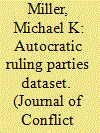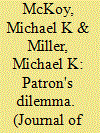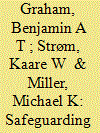|
|
|
Sort Order |
|
|
|
Items / Page
|
|
|
|
|
|
|
| Srl | Item |
| 1 |
ID:
157903


|
|
|
|
|
| Summary/Abstract |
Protests and democratic transitions tend to spread cross-nationally. Is this true of all political events? We argue that the mechanisms underlying the diffusion of mass-participation events are unlikely to support the spread of elite-led violence, particularly coups. Further, past findings of coup contagion employed empirical techniques unable to distinguish clustering, common shocks, and actual diffusion. To investigate which events diffuse and where, we combine modern spatial dependence models with extreme bounds analysis (EBA). EBA allows for numerous modeling alternatives, including diffusion timing and the controls, and calculates the distribution of estimates across all combinations of these choices. We also examine various diffusion pathways, such as contagion among trade partners. Results from nearly 1.2 million models clearly undercut coup contagion. In comparison, we confirm that more mass-driven political events robustly spread cross-nationally. Our findings contribute to studies of political conflict and contagion, while introducing EBA as an effective tool for diffusion scholars.
|
|
|
|
|
|
|
|
|
|
|
|
|
|
|
|
| 2 |
ID:
172340


|
|
|
|
|
| Summary/Abstract |
How do autocratic ruling parties gain power? What predicts their durability and how they fall? This article introduces the Autocratic Ruling Parties Dataset, the first comprehensive data set on the founding origins, modes of gaining and losing power, ruling tenures, and other characteristics of autocratic ruling parties. It covers all ruling parties in the world from 1940 to 2015. Contrary to common assumptions, most ruling parties are not created by sitting dictators, but follow a range of paths to power that influence their style and duration of rule. To illustrate the data’s uses, the article confirms that ruling parties stabilize autocracies. Further, parties’ origins and histories matter, with revolutionary and foreign-imposed parties the most durable and parties empowered through elections the least durable. By recognizing ruling parties’ heterogeneity, histories, and potential autonomy from individual dictators, the data can contribute to open questions on autocratic politics, regime stability, and democratization.
|
|
|
|
|
|
|
|
|
|
|
|
|
|
|
|
| 3 |
ID:
115206


|
|
|
|
|
| Publication |
2012.
|
| Summary/Abstract |
We analyze an understudied mode of democratization in which the acquiescence of an autocratic regime's foreign ally, or patron, is pivotal to the success of a democratic movement. Although a democratic patron may prefer having democracy in its dependent allies, regime change threatens the economic and security benefits associated with the alliance. We formalize this dilemma through a repeated principal-agent model and demonstrate that the critical dimension is the patron's beliefs about the potential democracy's policies rather than its value for democracy or the alliance goods. Patron support hinges on democratic movement signaling of its capacity to rule, popular support, and commitment to preserving the alliance. To test our theory, we analyze twenty-five democratic openings in American cold war clients, followed by case studies of US-aided democratization episodes in the Philippines and South Korea. We conclude with an analysis of the recent Egyptian revolution.
|
|
|
|
|
|
|
|
|
|
|
|
|
|
|
|
| 4 |
ID:
156698


|
|
|
|
|
| Summary/Abstract |
Democracy is often fragile, especially in states recovering from civil conflict. To protect emerging democracies, many scholars and practitioners recommend political powersharing institutions, which aim to safeguard minority group interests. Yet there is little empirical research on whether powersharing promotes democratic survival, and some concern that it limits electoral accountability. To fill this gap, we differentiate between inclusive, dispersive, and constraining powersharing institutions and analyze their effects on democratic survival from 1975 to 2015 using a global dataset. We find sharp distinctions across types of powersharing and political context. Inclusive powersharing, such as ethnic quotas, promotes democratic survival only in post-conflict settings. In contrast, dispersive institutions such as federalism tend to destabilize post-conflict democracies. Only constraining powersharing consistently facilitates democratic survival regardless of recent conflict. Institution-builders and international organizations should therefore prioritize institutions that constrain leaders, including independent judiciaries, civilian control of the armed forces, and constitutional protections of individual and group rights.
|
|
|
|
|
|
|
|
|
|
|
|
|
|
|
|
|
|
|
|
|